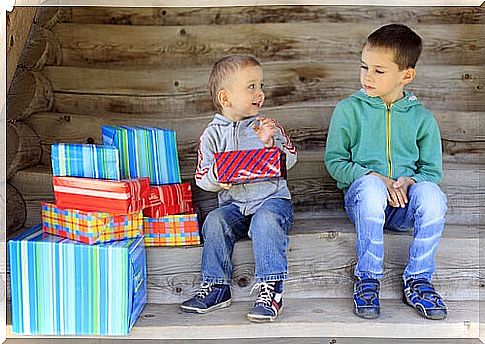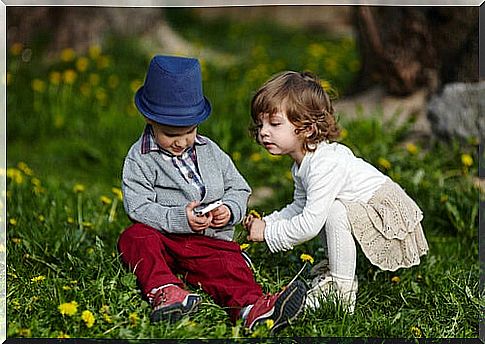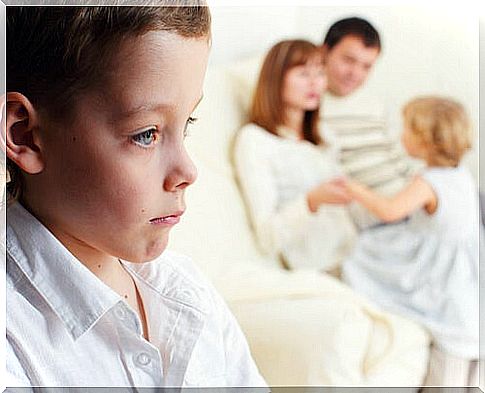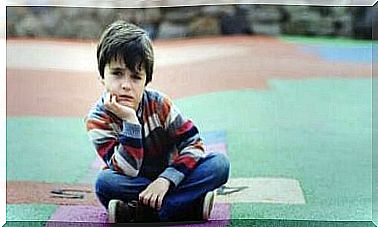Envy In Children: Causes And Ways To Make It Pass

Towards a brother, a friend or a school friend. For friendships, grades or toys. Envy in children can have many targets and causes. But one thing is certain: it is a feeling that is not at all edifying.
Envy is a negative feeling that impoverishes the soul of the person who experiences it. In adults, the causes that generate it have to do with money, work and even love. Well, what triggers envy in children? You will find out by continuing to read.
The vocabulary defines envy as the feeling of sadness or grief for the possessions of others or the desire for something that one does not possess. Even though people resort to different beliefs and superstitions (such as the classic red ribbon) in order not to be overwhelmed by their own or others’ envy, envy is a very common feeling.
It is a universal feeling. No matter how hard they try, anyone will happen to feel envy sooner or later in their life, as it is a reaction of social interaction.
Many times it doesn’t even have to do with the lack of something. On the contrary, people who are envious are often those who are in a better position than others. And despite this, they get irritated by the happiness, material possessions, and even opportunities that others have.
Envy in children: what causes it?
In the little ones, the origin of envy can manifest itself on the basis of parameters that they consider important. For example:
- The votes.
- Games or similar material goods.
- The number of friends.
- Physical characteristics (being taller, thinner, stronger, etc.).
- The attention received by adults (parents and teachers above all).

As we said before, envy in children, as well as in adults, is not always linked to the fact of “not having”. There are not a few cases of children who have practically everything they want and, despite this, as soon as they see that a friend of theirs buys something they like, they feel envy and immediately want that thing too.
One of the explanations for this feeling could be that they are not used to this “disadvantage” situation, so to speak. And that is that they have always been the ones to have “what” others wanted. When the opposite happens, they don’t take it well at all.
What to do when a child is envious?
Beyond the specific cause at the origin of this feeling, there is a certain lack of self-confidence, affection and self-esteem that must be recognized.
In other words, the child wants to be on the same level or constantly surpass others because he is convinced that, if he does not, he will receive less attention, love and esteem.
Don’t compare him to other children
Comparisons are always hateful. Telling him “Why aren’t you like Peter who gets good grades?” Or “Why don’t you kick like Juan?” the last thing we will achieve is to motivate the child to improve. Rather. Creating this competitive spirit is not good at all.
What we need to do is set a realistic goal based on the child himself. A goal that can be reached in the short or medium term, so that our child does not lose enthusiasm. This way, instead of being better than someone, we will urge them to be the best version of themselves.
Offer him affection and attention
In childhood, some things are more important than feeling considered. The amount of attention, understanding and respect a child receives should not be based on grades, sports performance or any other measurement.
Make your child feel like the protagonist of your life, regardless of the circumstances. That way he won’t be overwhelmed with envy when his brother or friend owns something he doesn’t have. The affection of his parents will suffice.

Talk about envy with him
We are not referring only to the negative effects of envy or the fact of “forbidding” him to feel it towards others. In fact , envy in children can be channeled in a positive way.
How? Try to foster a healthy competitive spirit in your child. That is, if a friend has better grades, tell them that they can try harder to improve theirs. If another child plays tennis better than him, he can ask them to train together to improve each other or to pair up in a doubles.
Envy in children, in the best sense of the phrase, can be a major driver in their life. It must always be an impulse to overcome oneself and must never turn into a desire for the other to go wrong.
Finally, and as we always say, don’t forget that children are nothing more than a reflection of their parents’ behavior. Therefore, avoid making malicious comments (especially in their presence) and instill in them a benevolent and understanding view of others.









